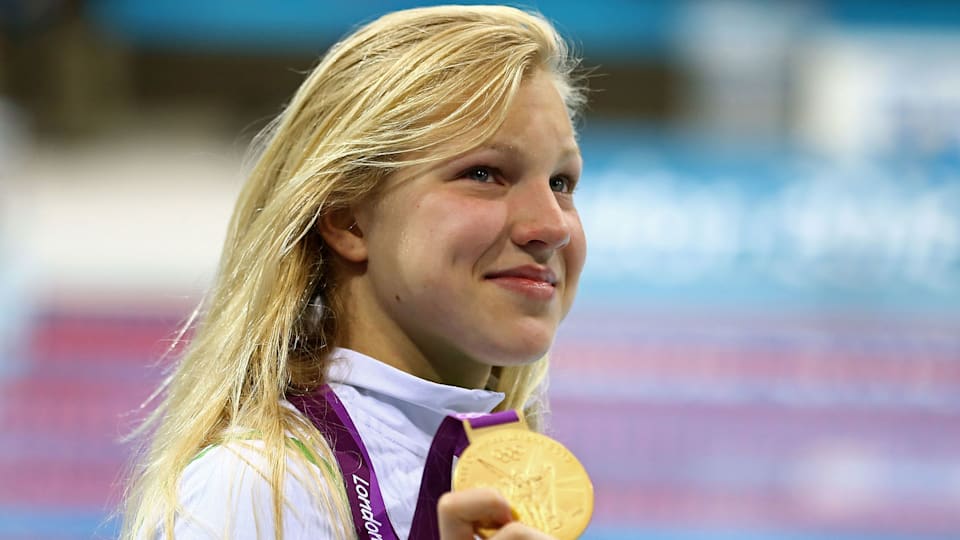
Since her stunning triumph at London 2012, where she won 100m breaststroke gold at the age of just 15, Lithuania’s Rūta Meilutytė has continued to dominate her event and she is intent on retaining her title in Rio.
“I think about Rio every day. It’s my number one objective for the next four years,” said teenage swimming sensation Rūta Meilutytė back in October 2012. The youngster had just returned from her native Lithuania, where she had been given a rapturous homecoming after winning 100m breaststroke gold at the London Games.
“Going into the Olympics [in London] my biggest expectation was to make the final,” recalls the teenager, who since 2010 has been based in the British city of Plymouth. “That’s all I ever wanted to do at that time,” she explains. However, after posting a national record of 1:05.56 in the heats and then a European record of 1:05:21, she began to set her sights a little higher.
Tears of joy
“My grandmother was there. Some of my friends came and the Lithuanian President was there watching the race too,” she recalls. “No one knew who I was really. I was so happy with my time in the heats. I just needed to repeat that two more times. That’s what I was focusing on. I think I was one of the youngest in the field. One of the favourites was definitely the world champion and the Olympic champion Rebecca Soni.”
The youngest of the eight finalists, Meilutytė lined up in Lane 5, alongside the USA’s Breeja Larson, who committed a false start. “It didn’t put me off at all,” says the Lithuanian. “Things like that happen: nothing to get nervous or worried about. I just waited for everything to pass and just tried to stay in my zone.”
Reasoning that her opponents would finish more strongly than her, Meilutytė decided to go flat out from the start, and took an early lead. She turned for home still ahead of the field, with Larson 0.29 seconds behind her and Russia’s Yuliya Efimova a further five hundredths off the pace.
With the crowd roaring the swimmers on, the leader maintained her advantage as she headed for home: “All I could see was the wall so I was just focusing on that, and that was my goal, just trying to get to it as fast as I could, without looking to the sides or anything.”
Behind her, Soni led the chase. “The race was going pretty well until the last 15 metres,” recalls Meilutytė. “I was starting to hurt and the girls were starting to catch me up. I tried not to look. I knew those girls were really strong at coming back, and all I needed to do was keep my eyes on my own lane and focus on my own swimming rather than anyone else’s.”
Keeping her focus to the end, Meilutytė touched the wall first, stopping the clock at 1:05.47, with Soni just 0.08 seconds behind. “If it had been a 105m race, then I think I would have lost,” she reflects. “I couldn’t believe it. It was overwhelming: just so much emotion coming over me.”
Her country’s very first swimming medallist, the Kaunas-born teen had also become the youngest women’s Olympic 100m breaststroke champion of all time. And when the time came for her to step up to the podium to collect her gold medal, the enormity of the occasion caused her to shed a tear or two.
“That’s been my dream ever since I was little: being able to represent my country and maybe one day – but definitely not at those Olympics – I could stand up on that podium and hear my country’s national anthem. I didn’t expect to do that in London. It was such a proud moment. Definitely a dream come true.”
A double world record holder
London 2012 was only the start for the irrepressible Meilutytė, who has since dominated in both the 50m and 100m breaststroke. Not content with holding world records at both distances (28.48 for the 50m and 1:04.35 for the 100m, both set in 2013), she is the reigning world and European 100m breaststroke long-course and short-course champion, and holds the same titles in the 50m event, bar the world long course.
In the meantime, she continued to compete at junior level through to 2014, proving equally as dominant. Victorious in her two favoured events at the Youth Olympic Games Nanjing 2014, she followed up by overpowering her senior rivals to win the European 50m title a few days later.
Her meteoric rise was temporarily halted when she fell off her bike in September 2015, injuring her elbow. After undergoing surgery and having a metal plate inserted into her arm, which was removed at the end of that year, she returned to winning ways, retaining her European 100m title in May 2016, posting a time of 1:06.17 to finish just ahead of Iceland’s Hrafnhildur Lúthersdóttir and Great Britain’s Chloe Tutton.
“I’ve had a lot of challenges and lots of ups and downs,” she muses. “But you have to try and stay positive, take what you can from the experiences, overcome those challenges and learn something new. I have learned a lot in the last couple of years.”
There can be no arguing with that. Displaying a maturity beyond her years, the 19-year-old Lithuanian will have nothing but victory on her mind when she heads to Rio this summer.
